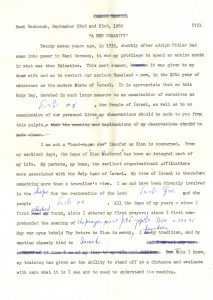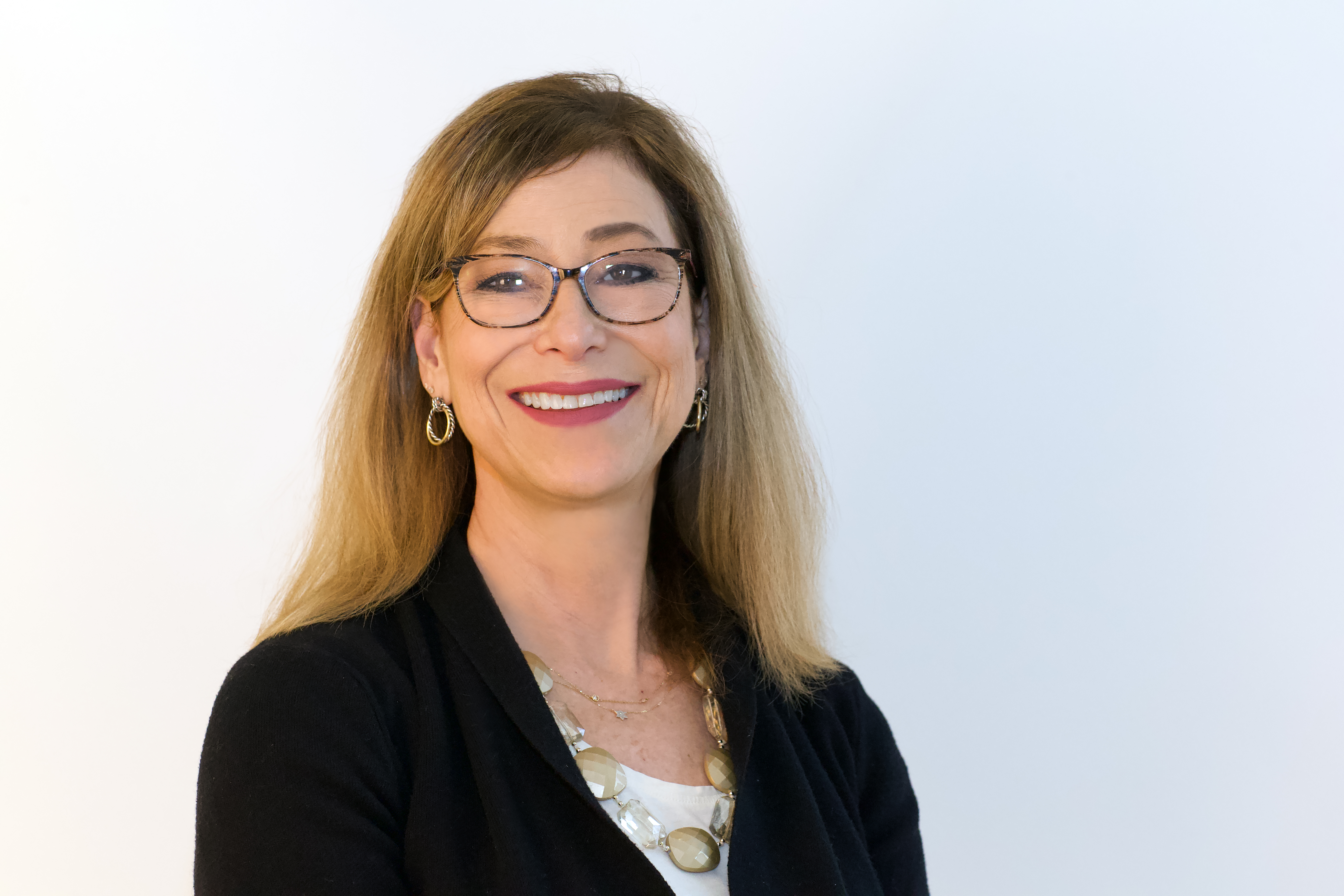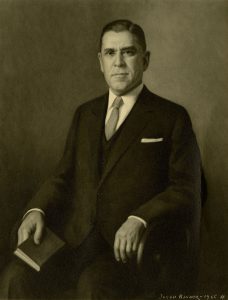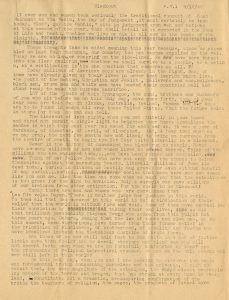Many years ago, as a graduate student in English, I discovered, to my surprise, how fascinating it was to read the sermons of early Puritan American ministers as works of literature. I’ve since come to appreciate that in addition to their literary value, sermons also provide snapshots of the historical moments from which they emerge. The best ones have staying power long past their delivery, as both spiritual meditation and historical document. This was brought home for me recently as I was looking through the papers of Rabbi Albert Gordon housed in the Wyner Family Jewish Heritage Center’s archives.
Rabbi Gordon’s Archived Rosh Hashanah Sermons
A Conservative rabbi, Gordon was a leading Jewish thinker and writer of the first half of the 20th century, publishing books on Jewish life in America and serving in national leadership roles that helped shape Jewish thought and practice. After serving congregations in Washington, Minneapolis, and New York between 1929 and 1950, he spent the last eighteen years of his career at Temple Emanuel in Newton, Mass. With this fall’s Jewish High Holidays approaching, I found myself exploring Rabbi Gordon’s archived Rosh Hashanah sermons. Read successively, they provide a compelling view into not only the spiritual themes of the Jewish High Holiday season—reflection, repentance, and renewal—but also a pivotal historic period in American Judaism.
The twelve Rosh Hashanah sermons in the collection span from 1934 to 1960. With historical hindsight, we can read Rabbi Gordon’s words over that period as first ominous, then despairing, and finally hopeful. In the earliest sermon (untitled, dated 1934), Gordon ponders on the seeming loss of faith of many American Jews, opining that previous generations had a simpler, purer faith, but “today’s” Jews often seem to think of the questions and requirements of religion as “a problem” that they would just as soon avoid. He urges his congregation to see the challenges of religion as similar to those of family, education, society—challenges to take on positively and expansively, to solve rather than run from. While in this sermon he was commenting on the state of American Jewry in the 1930s, Gordon returned to similar themes over the years—and indeed, across many ages and religions, one might hear comparable sermons condemning the attraction of secular, modern life over a more spiritual one.
“These are crucial days for all of us”
In a 1936 Rosh Hashanah sermon, Gordon again worries about secularism and a lack of spiritual gravity in American Jews. His theme is “false idols [gods],” and he criticizes the excessive comfort of American Jews and the lure of a contemporary life that pulls people away from spiritual, moral ways. But halfway through, the sermon takes a sudden, darker turn as Gordon speaks of “false gods of Force and Violence, The Gods of Dictatorship and Hatred. . . . The Fascists and the would-be fascists, the Mussolinis and Hitlers and Coughlins. . . . These are the menaces.” Here, the sermon confronts head-on the gathering threat of the time. “These are crucial days for all of us,” Gordon writes. “We Jews who are facing one of the greatest crises in human history must listen to the sound of the Shofar today.” In the face of later debates about how much Americans understood what was happening in Europe—and when they understood it—Rabbi Gordon’s sermon makes it clear that many understood the looming catastrophe well enough.
“Only a miracle can save millions of our brethren . . ."
Hitler is barely mentioned—but is everywhere—in the most despairing sermon in the collection, “Blackout” (1942). The image of wartime blackouts becomes Gordon’s central metaphor for the state of the world. This is the shortest of Gordon’s sermons in the collection—and the most emotional and exhortative. “Never in the history of humankind has blood run so deeply. Never have so many millions of men and women lived in mortal terror,” he writes. “Only a miracle can save millions of our brethren from utter extinction. For the world is in blackout!” Worrying that Jews, and humanity, may have brought the global situation on themselves by turning away from timeless truths, Gordon writes, “Had we heeded the message of Religion before these days of blackout, we would not be offering up our sons and brothers on the sacrificial altar today.” In this piece, the rabbi’s authoritative voice takes on a beseeching tone. He stands before his congregation as both a moral leader and a shocked, frightened fellow man.
Nearly a decade after the end of the war, Gordon’s untitled 1956 Rosh Hashanah sermon discusses the United States returning to religion. Citing recent statistics, he notes that new houses of worship were springing up and there is “a religious revival going on in our country.” Acknowledging that the attraction to religion for a war-weary populace may be a need for companionship and affiliation more than a need for God, he cautions his congregation to seek out religious spaces and observance for personal betterment and to become closer to God, not just to each other. Just as he did two decades and a world war earlier, Rabbi Gordon urges Jews to prioritize their faith over more worldly concerns. His return to this focus in the post-war period suggests his and his community’s terror and angst had begun to lift.
Gordon’s words remind us of its early hope . . .
 First page of Rabbi Gordon’s 1960 sermon on Israel. Note his annotations in both English and Hebrew.
First page of Rabbi Gordon’s 1960 sermon on Israel. Note his annotations in both English and Hebrew.
In the last Rosh Hashanah sermon in the collection, from 1960, “A New Humanity,” Rabbi Gordon sounds a more optimistic note as he speaks of the historical and biblical actualization that the new state of Israel represents. Here, he is forward-looking and points to the promise of a new democratic land, with a population of Jews who can at last live in peace and can hold their heads up after decades (and millennia) of persecution. I find this view of Israel’s promise, and the softening of Gordon’s dark tone, poignant. No matter what one thinks of Israel today, Gordon’s words remind us of its early hope, its promise of safety and freedom for a battered, exhausted Jewry. “It [is] an Inner Security that characterizes [Israelis],” he writes. “This people is at home.”
Rabbi Gordon served at Temple Emanuel until his death in 1968. It’s fascinating to contemplate what he would have thought of American and Israeli life in successive decades. Rabbis have continued to examine the issues and challenges of our times through the prism of the Torah and the themes of this annual season of reflection. Cyclical, timeless, and timebound, the Jewish High Holidays offer lessons about our past as they help contextualize the present. So, too, do the sermons they inspire.
To those who celebrate these High Holidays: Happy New Year and L’Shanah Tovah.
Share this:

About Rachel King
Rachel King has held senior management positions at a range of Boston-area cultural and educational non-profits, including the Jewish Women's Archive, Handel and Haydn Society, and Boston Ballet. She brings deep experience in communications, fundraising, strategic planning, and operations to advance the mission of the Wyner Family Jewish Heritage Center at American Ancestors. Rachel is a magna cum laude graduate of Brown University and has a Master’s degree in English and American Literature from Columbia University. In her volunteer life, she serves on the Board of Trustees of Temple Shalom of Newton and on the Board of Directors of the Touro Synagogue Foundation, and is a Mentor for the Alray Scholars Program.View all posts by Rachel King →

